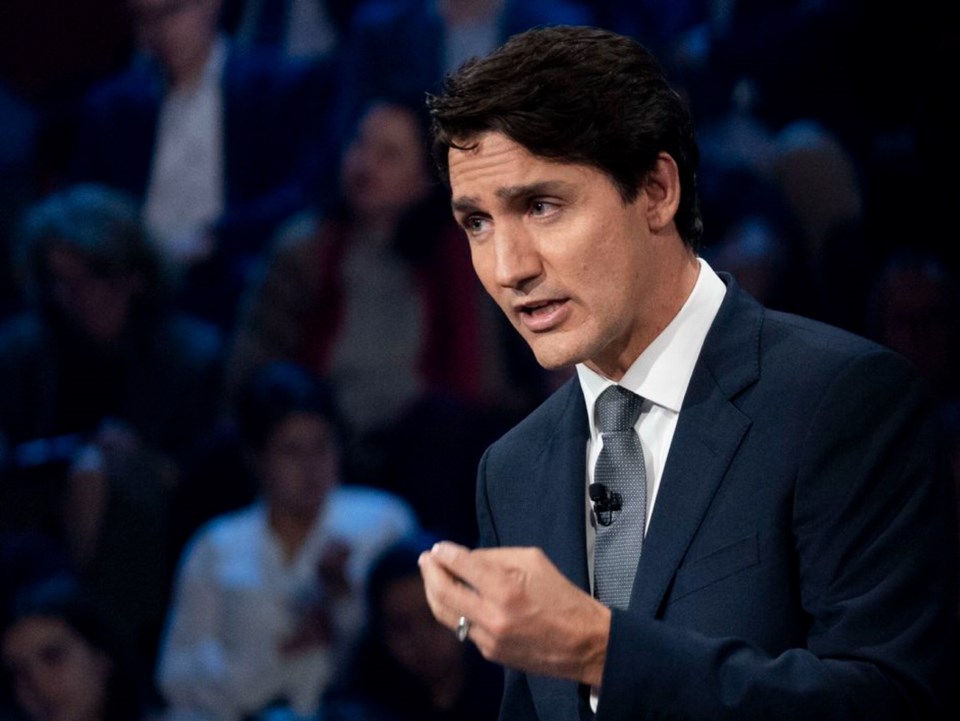“Victory lap” isn’t the first word that comes to mind in describing what Prime Minister Justin Trudeau’s first post-election move will be.
It’ll be more like an “avoided defeat” limp, with the NDP holding up the crutches for an indeterminate period that’s likely less than four years.
The federal Liberals were curtailed, reduced and curbed from coast to coast Monday. Their vote share dropped in every province. All that saved them from catastrophe is that the drop was minimal in central Canada, where there is more at stake and where Liberals built a big stockpile of seats in 2015.
In B.C., the Liberals were down five seats at press time, the Conservatives had more than doubled their seat count (to 17), the NDP was down one at 11 and the Greens were even at two.
Similar results played out across most of Canada, with the Conservatives improving their national standing, but falling far short of winning.
They improved their standing based on Liberal stumbles, but they’ll be blocked from wins until they do more than just pay lip service to climate change.
The election campaign was almost drama-free in B.C. The TV networks declared a Liberal victory 11 minutes after the polls closed here at 7 p.m., which scrubs a lot of involvement out of the process for most British Columbians. The minority call came a few moments later. The wait for an election where “B.C. made the difference” continues.
The immediate focus now is on how the federal Liberals and federal NDP can work together. Liberal seats plus NDP seats equals a majority with some to spare, regardless of what the other parties do.
There are some profound differences, but they will be overcome in the short term for simple practical reasons. Mostly, that nobody wants another election in the next year or so, and no party can afford one.
The biggest difference is on the Trans Mountain pipeline expansion. Trudeau is obviously a backer, given that he bought the enterprise and is essentially chairman of the board now.
NDP Leader Jagmeet Singh, whose Burnaby South riding is a hotbed of opposition to the pipeline, has been fighting it as a matter of course.
But there is no opportunity on the immediate horizon for that argument to make a political difference. The pipeline is a done deal. Maybe one of the on-going court actions could draw it back into the political arena, as has happened in the past. But if push came to shove in the House of Commons, the Conservatives, who now own virtually all of Alberta politically, would be obliged to support the Liberals on it.
The other issue to be ironed out between the two parties and leaders is electoral reform. Singh is an ardent advocate of proportional representation. Trudeau was just as keen on electoral reform, but abandoned the process when it dawned on him how complicated devising an alternative can be.
If he decides to throw a sop to the NDP as a goodwill gesture and re-open that issue, it will land hard in B.C.
Long-suffering B.C. voters have endured years of arguments on electoral reform and voted three times in the past 14 years on a few of the infinite variations. They rejected the first one in 2005, so the B.C. Liberal government lowered the approval threshold and tried again. Voters rejected it again in 2009.
The provincial NDP tried again last year and tilted nearly everything they could in favour of a yes vote. The people said no, decisively.
Another argument would be more than some voters could take, but it may come to that as the minority government takes shape.
Singh has other things to worry about, as the party’s seat count went from 39 to elected or leading in 25. It’s a measure of how expectations had sunk that a scant two dozen seats is viewed as OK in some quarters.
Another leader in that twilight zone between winning and not winning enough is the Green Party’s Elizabeth May. The Greens’ byelection win in Nanaimo-Ladysmith with Paul Manly in May was confirmed. And they picked up a seat in Fredericton.
But the six per cent vote share across Canada is well below her public expectations, and likely her private ones as well.



